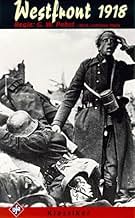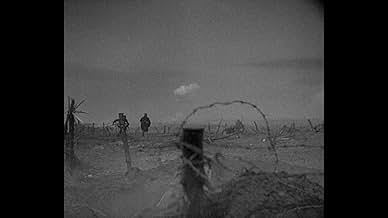IMDb-BEWERTUNG
7,3/10
2654
IHRE BEWERTUNG
Eine Gruppe deutscher Soldaten kämpft am Ende des Ersten Weltkriegs in Frankreich an der Front.Eine Gruppe deutscher Soldaten kämpft am Ende des Ersten Weltkriegs in Frankreich an der Front.Eine Gruppe deutscher Soldaten kämpft am Ende des Ersten Weltkriegs in Frankreich an der Front.
- Regie
- Drehbuch
- Hauptbesetzung
- Auszeichnungen
- 1 wins total
Hans-Joachim Möbis
- Der Student
- (as H.J. Moebis)
Aribert Mog
- Undetermined Secdondary Role
- (Nicht genannt)
Gustav Püttjer
- Hamburger
- (Nicht genannt)
André Saint-Germain
- Undetermined Secondary Role
- (Nicht genannt)
Vladimir Sokoloff
- Meal Orderly
- (Nicht genannt)
Ilse Trautschold
- Undetermined Secondary Role
- (Nicht genannt)
Emil Wabschke
- Undetermined Secondary Role
- (Nicht genannt)
Empfohlene Bewertungen
My husband and I just finished seeing this movie. We hadn't heard of it before. We were quite impressed. It's an old movie. It was made just at that time when overacted stage conventions were being abandoned for the more subtle gestures of film. Taking that into account, this movie for us packed quite a wallop.
This is a movie about people attempting to fight a war as a group of small-towners who get to know each other and build a society as they go. Although they don't like the war, they are willing to go and do their part. But can these deep relationships endure in the face of an impersonal war machine? And whose fault is it if they can't? Who is responsible for the situation?
There's a fairly slow start, during which the movie establishes relationships, etc. Then there is a decisive battle. Somehow there isn't another trench warfare movie I can think of which really gets the nuances and habits of the people who were in the trenches in World War I, on either side. We don't have anything like it now. And yet it's not gruesome, so don't be worried about that. I'd definitely recommend this movie, especially in mid-2006 in the U.S. This movie asks all the right questions, subtly but effectively.
This is a movie about people attempting to fight a war as a group of small-towners who get to know each other and build a society as they go. Although they don't like the war, they are willing to go and do their part. But can these deep relationships endure in the face of an impersonal war machine? And whose fault is it if they can't? Who is responsible for the situation?
There's a fairly slow start, during which the movie establishes relationships, etc. Then there is a decisive battle. Somehow there isn't another trench warfare movie I can think of which really gets the nuances and habits of the people who were in the trenches in World War I, on either side. We don't have anything like it now. And yet it's not gruesome, so don't be worried about that. I'd definitely recommend this movie, especially in mid-2006 in the U.S. This movie asks all the right questions, subtly but effectively.
In this German WW1 movie from director G. W. Pabst, the film follows a small group of German infantrymen during the waning days of the war. The "Student" (Hans-Joachim Moebis), a young eager soldier, volunteers for dangerous messenger duty in order to grab time with a nearby village girl (Jackie Monnier). Karl (Gustav Diessl) pines for his wife back home, but a trip back during leave doesn't bring the desired results. And all around them rains death and destruction. Also featuring Claus Clausen.
This makes for an interesting companion piece to this same year's All Quiet on the Western Front. This movie is a bit rawer, with some minor fondling and cursing that wouldn't have made it into a US film, even during the pre-code era. The performances are all good, and I especially liked the turn by Clausen as an intense lieutenant in over his head. There's a section in a beerhall with a USO-type show featuring musicians, a raunchy singer, and a clown, that goes on a bit too long. The last 15 minutes or so are some of the most devastating war scenes in film. Highly recommended. .
This makes for an interesting companion piece to this same year's All Quiet on the Western Front. This movie is a bit rawer, with some minor fondling and cursing that wouldn't have made it into a US film, even during the pre-code era. The performances are all good, and I especially liked the turn by Clausen as an intense lieutenant in over his head. There's a section in a beerhall with a USO-type show featuring musicians, a raunchy singer, and a clown, that goes on a bit too long. The last 15 minutes or so are some of the most devastating war scenes in film. Highly recommended. .
Very much worth viewing. I caught it on Turner Classic Movies recently, and was very pleasantly surprised by the quality of this film.
This film transcends the limitations of the sensibilities of the time and the special effects available to movie makers. It makes no sweeping statements or judgments about war and aggression. It simply gives you a glimpse of what it was like to live and die in the trenches of The Great War.
Although not as intense as "All Quiet on the Western Front" (whose subject matter it shares), it has its moments of artistry. It is also more narrowly focused than "All Quiet..", but its story is compelling and riveting. Should be in anybody's serious list of worthy war movies.
This film transcends the limitations of the sensibilities of the time and the special effects available to movie makers. It makes no sweeping statements or judgments about war and aggression. It simply gives you a glimpse of what it was like to live and die in the trenches of The Great War.
Although not as intense as "All Quiet on the Western Front" (whose subject matter it shares), it has its moments of artistry. It is also more narrowly focused than "All Quiet..", but its story is compelling and riveting. Should be in anybody's serious list of worthy war movies.
Invariably any piece of art banned by the Nazis as degenerate or in this case "cowardly defeatism" has something to offer. G.W Pabst crafts a powerful antiwar film by simply showing so many of its truisms - the senseless, horrific death of course, but also many other subversive elements, e.g. the possibility of friendly fire, the idiotic decisions made by leaders who are out of harm's way being served posh courses of food, one's wife or girlfriend being unfaithful, and the psychological trauma. At his best he simply leaves the camera stationary in longshot while men scurry about and kill one another for no good reason, letting the viewer draw their own conclusion about the madness they're witnessing.
I have to say though, the impact of it all was a little lessened because the images and concepts weren't as novel for me 90 years later, as unfair to the film as that might be. It lags as well when it's off the battlefield, showing among other things an uninteresting (and long) performance at a canteen, and the confrontation with the wife in bed with another man. I think it was trying to balance out the warfare and build up characters so that we were invested in them, but I struggled to stay interested (this and the bleakness of the thing make it one I wouldn't reach for again). Kudos to Pabst for making it, and I loved the way he closes it with "The End?!", certainly well aware of growing militarism and possibility for another devastating war.
I have to say though, the impact of it all was a little lessened because the images and concepts weren't as novel for me 90 years later, as unfair to the film as that might be. It lags as well when it's off the battlefield, showing among other things an uninteresting (and long) performance at a canteen, and the confrontation with the wife in bed with another man. I think it was trying to balance out the warfare and build up characters so that we were invested in them, but I struggled to stay interested (this and the bleakness of the thing make it one I wouldn't reach for again). Kudos to Pabst for making it, and I loved the way he closes it with "The End?!", certainly well aware of growing militarism and possibility for another devastating war.
The very interesting director, GW Pabst directs a war movie in his first movie with sound, and he uses it to amazing effect. There hardly is a story, just the usual Some Nice Kids Go To War And Find Out That, Gee! War Is Hell! Hokum. The movie is nothing but a sensory experience. The war scenes in this movie are very frighteningly realistic. TO be honest, I have NO idea how he achieved some of the explosion shots. They looked like they were exploding very close to the actors in some scenes. I guess they didn't have actor's unions in those days. LOL..
Film can overextend its welcome, but it depends on what you're looking for, I guess.
Film can overextend its welcome, but it depends on what you're looking for, I guess.
Wusstest du schon
- WissenswertesThis film was banned by the Nazis after they came into power in Germany in 1933.
- PatzerThe depth of the trenches is inaccurate. In several scenes where the soldiers are standing up, their heads are higher than the top of the trench, making them easy targets for snipers and also allowing the French to monitor troop movements.
- Zitate
Woman in rationed food line: What are you doing? Back of the line!
Another Woman in rationed food line: What's wrong with the old cow? Cutting in line!
Man in rationed food line: Leave the woman alone.
Woman cutting in rationed food line: My Adolf is dead.
Woman in rationed food line: Think you're the only one? That's no reason to cut in line. Go to the back!
- VerbindungenEdited into A Hellish Chaos (2017)
Top-Auswahl
Melde dich zum Bewerten an und greife auf die Watchlist für personalisierte Empfehlungen zu.
- How long is Westfront 1918?Powered by Alexa
Details
- Erscheinungsdatum
- Herkunftsland
- Sprachen
- Auch bekannt als
- Vier von der Infanterie
- Drehorte
- Produktionsfirmen
- Weitere beteiligte Unternehmen bei IMDbPro anzeigen
- Laufzeit
- 1 Std. 37 Min.(97 min)
- Farbe
- Seitenverhältnis
- 1.20 : 1
Zu dieser Seite beitragen
Bearbeitung vorschlagen oder fehlenden Inhalt hinzufügen














